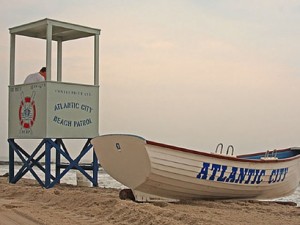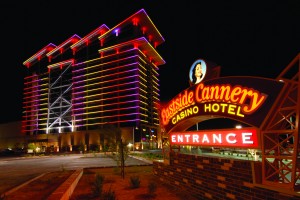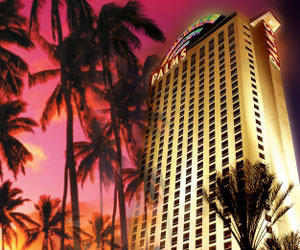We’ve come a long way from the days of Reefer Madness. Latest case in point: Atlantic City, where Assemblyman Reed Gusciora (D) is pushing recreational “tea” as a cure to the city’s penurious condition. Weed would be legalized on the Boardwalk and taxed 20%.  Half of that amount would go to alleviating Atlantic City’s fiscal problems, another 30% would be dedicated to transportation infrastructure, and the remainder would be split between anti-drug enforcement and women’s health. Gusciora’s introduced legislation called “Promoting Opportunities for Tomorrow” (POT, geddit?), arguing that prosecuting marijuana offenses “is archaic and has had a disparate, harmful impact on minority communities … A well-designed and heavily regulated marijuana industry would move Atlantic City’s economy into the 21st century and provide extreme economic benefits to a new generation of Atlantic City residents and business interests, including existing hotels and casinos.” (You can see the casinos installing enclosed, pot-smoking lounges even as we speak, can’t you?)
Half of that amount would go to alleviating Atlantic City’s fiscal problems, another 30% would be dedicated to transportation infrastructure, and the remainder would be split between anti-drug enforcement and women’s health. Gusciora’s introduced legislation called “Promoting Opportunities for Tomorrow” (POT, geddit?), arguing that prosecuting marijuana offenses “is archaic and has had a disparate, harmful impact on minority communities … A well-designed and heavily regulated marijuana industry would move Atlantic City’s economy into the 21st century and provide extreme economic benefits to a new generation of Atlantic City residents and business interests, including existing hotels and casinos.” (You can see the casinos installing enclosed, pot-smoking lounges even as we speak, can’t you?)
Gusciora’s idea doesn’t appeal to all his fellow Democrats. “Though we appreciate the Assemblyman’s efforts to create additional revenue streams for Atlantic City, I can’t support promoting drug use,” said City Council President Marty Small (D). As for Mayor Don Guardian (R), he’s keeping his opinions to himself. We don’t know if Gusciora is up for reelection this fall but we’ve already got a campaign slogan: “Weed for Reed.”
And of course we’ve all got the same, burning question: What does Glenn Straub think?
* MGM Resorts International was feeling its oats when it met with JP Morgan analyst Joseph Greff. It expects MGM National Harbor to be its most profitable non- Vegas casino “benefitting from 3,000 rooms within trolley distance.” High-roller villas are behind schedule at MGM Grand Cotai but, when the megaresort opens, “MGM continues to expect the property to punch above its weight.” Nor is REIT MGM Growth Properties just looking at acquisitions outside the company. Bellagio, The Mirage and Circus Circus are back on the sale block, as is the in-progress Park Theater, plus joint ventures CityCenter and Grand Victoria (in Elgin, Illinois). Buying Boyd Gaming out of Borgata “should provide an influx of new [player’s club] members as there is only a 5% overlap between M Life and Borgata’s existing program.”
Vegas casino “benefitting from 3,000 rooms within trolley distance.” High-roller villas are behind schedule at MGM Grand Cotai but, when the megaresort opens, “MGM continues to expect the property to punch above its weight.” Nor is REIT MGM Growth Properties just looking at acquisitions outside the company. Bellagio, The Mirage and Circus Circus are back on the sale block, as is the in-progress Park Theater, plus joint ventures CityCenter and Grand Victoria (in Elgin, Illinois). Buying Boyd Gaming out of Borgata “should provide an influx of new [player’s club] members as there is only a 5% overlap between M Life and Borgata’s existing program.”
The company expects to generate $10 million a year in cash flow from its new M Life Rewards Master Card. As for the advent of a new, mobile application for sports betting, that may explain MGM’s rather sudden display of interest in daily fantasy sports, for which it has been lobbying of late.
* Deutsche Bank‘s Carlo Santarelli has been a busy boy this week, meeting with MGM, Boyd and Pinnacle Entertainment. Boyd opined that it was from done extracting cost savings from its recent acquisitions. It also expected improved performance at IP Biloxi, where “management is beginning to see visitation improve post the initial  marketing blitz from the Scarlet Pearl … As it pertains to Eastside Cannery, management believes there is an opportunity to market more prudently to the Sam’s Town/Eastside Cannery customers given the proximity of the assets.” Well, if they say so, although I still believe Eastside Cannery to be a redundant purchase.
marketing blitz from the Scarlet Pearl … As it pertains to Eastside Cannery, management believes there is an opportunity to market more prudently to the Sam’s Town/Eastside Cannery customers given the proximity of the assets.” Well, if they say so, although I still believe Eastside Cannery to be a redundant purchase.
Like Boyd, Pinnacle expects this month to be a more reliable barometer of the regional casino market than April and May were. (In Boyd’s case, May softness will be ameliorated when end-of-April slot revenues are reported as part of May’s numbers.) The company has added high-end Asian gaming pits at Ameristar St. Charles and Ameristar Kansas City, and an expanded smoking terrace at Belterra has translated into higher win per unit. “We believe the exit of Caesars [Entertainment] from the market should also help profitability as we anticipate a reduced marketing effort,” Santarelli concluded.
He also dropped in on Station Casinos, which is deep in planning for the post-acquisition era at the Palms. As you might expect, Station expects the 50/50 tourists-vs.- locals split to skew more toward locals once Station takes over (and brings the Palms into the Boarding Pass fold). It also hopes to bring down the amount of rooms (40%) that are being booked through online travel agencies, “a significant cost save, in our view.” Out at Red Rock Resort, whose growth was stunted by the Great Recession, meeting business is driving the bus (55% of room nights), which may portend a new convention center and even an additional hotel tower.
locals split to skew more toward locals once Station takes over (and brings the Palms into the Boarding Pass fold). It also hopes to bring down the amount of rooms (40%) that are being booked through online travel agencies, “a significant cost save, in our view.” Out at Red Rock Resort, whose growth was stunted by the Great Recession, meeting business is driving the bus (55% of room nights), which may portend a new convention center and even an additional hotel tower.
After a long period of seeming torpor, Station has turned out to be a beehive of activity. It’s applied for a gaming license in Reno, igniting a long-in-abeyance diversification into that market. Although the decision could come after the trigger-pulling on Durango Station, the smaller scale of the Reno project leads Santarelli to believe the latter will reach fruition sooner, a $100 million casino in a market that has seen “exceptionally strong” trends of late.
* Casino gambling failed in the Georgia Lege but the Georgia Lottery Corp. keeps on trucking. It just signed Scientific Games to a seven-year extension of their current pact.

